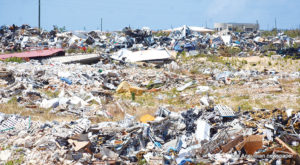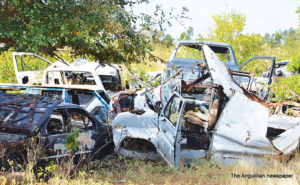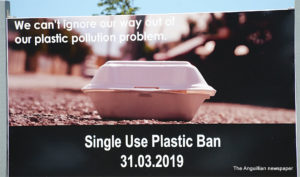
There is a coming new move to rid Anguilla of the scourge of derelict vehicles and wanton litter in private and public places across the island.
At the same time, consideration is being given to examine ways and means of further controlling the Corito dumpsite or landfill where a “mountain” of solid waste material, covered with marl, is rising higher and higher.
Mr. Cardigan Connor, Parliamentary Secretary, Tourism, a known advocate against litter, not only in his West End constituency, but in Anguilla generally, has been tasked with looking at the situation. The rationale is that Anguilla, an up-market tourism destination, should not be a place with unsightly derelict vehicles and litter – a matter that continues to attract much criticism and many complaints.
“For the past four years, since I was given the responsibility for tourism, by Chief Minister, Mr. Victor Banks, I have been looking at all aspects of what would create a positive image of Anguilla,” he told The Anguillian newspaper. “We are blessed with beautiful beaches, hotels, restaurants and of course our people are second to none, but still, as we move throughout our island, there are a lot of derelict vehicles and there is a lot of trash. In fact, by the end of this month, single plastic material will be banned and this is a positive start.
“This includes plastic bags, some of the straws and stereo foam material as well, and will be replaced by bio-degradable materials. The fact is that a lot of the single plastic materials, we have currently, are used once but they do not disintegrate. They are like Christmas decorations in a lot of our trees around the island.
“There are also a lot of derelict vehicles. Anguilla does not import any vehicles. All of them end up and die on the island. We buy too many second hand vehicles that last a very short time, and then they end up in people’s backyards and on the sides of the road. That creates a negative image for us, and so the Government we will implement some measures to deal with the situation.”
Mr. Connor continued: “In the case of derelict vehicles, there appears to be a bond that some people have with their first or only vehicle. We need to find a way of making sure that we can assist those persons who want to get rid of their old vehicles. Those who say they want to use them for parts – we will see how we can get those parts removed and take the shell away. The idea is to create a better image as we drive throughout our island.”

According to the Parliamentary Secretary, it is estimated that it costs up to US$100 to remove and dispose of derelict vehicles. “We think we can do it ourselves, but wherever we can get some assistance from stakeholders in the tourism industry, by all means we would be happy to accept that,” he said. “Everybody knows what is required – that we need to clean-up the island. The fact is: Are we prepared to assist each other to make it happen?”
He further stated: “The Litter Abatement Act has been sitting around for too long. We all know that we can do a better job of handling litter. We may ask a number of our people to volunteer one hour a month to undertake a clean-up, but that is not enough. It is how we can keep the island clean. With the law that says if you litter, you will be punished for it, this is something we really need to follow through on.”
Mr. Connor intimated that the Litter Abatement Act will be enforced to bring pressure on litter bugs. Among other matters the legislation, which operated for a short time, calls for the appointment of litter wardens and the imposition of penalties.
 Meanwhile, as stated earlier, a large area of the Corito dumpsite has already been filled with solid waste and covered. The mound is rising higher and higher and the problem is that supplies of marl are becoming scarce.
Meanwhile, as stated earlier, a large area of the Corito dumpsite has already been filled with solid waste and covered. The mound is rising higher and higher and the problem is that supplies of marl are becoming scarce.
It is understood that thought is being given to the possibility of burning some of the material which, although controlled, may be a controversial matter. While burning would not only reduce the bulk of the garbage, but the fly infestation as well, the dumpsite is situated in an area with downwind housing. To the south, there are bulk fuel installations – another matter of caution.
One way of dealing with scrapped metal, in terms of derelict vehicles, as well as thousands of tyres, is probably to examine the possibility of finding ways and means of exporting that solid waste for recycling.







